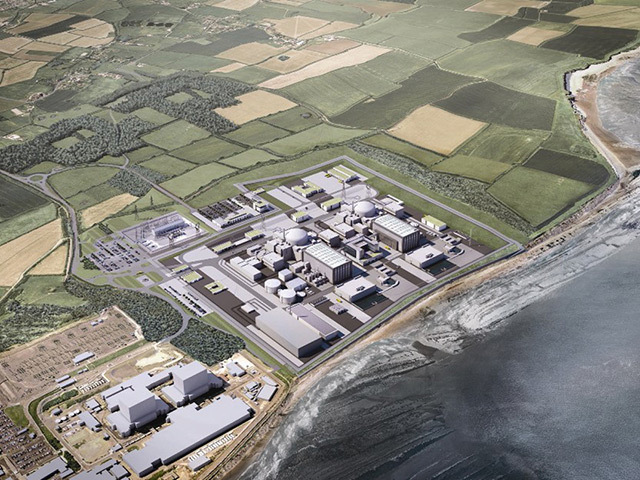
Electricite de France SA’s Chief Financial Officer Thomas Piquemal quit last week after disagreeing with Chief Executive Officer Jean-Bernard Levy on the timing of a plan to build new nuclear reactors at Hinkley Point in the U.K., people with knowledge of the matter said.
Piquemal resigned after expressing concern that a final investment decision on the project could be announced as early as April, a move he said might jeopardize EDF’s financial situation, the people said, asking not to be identified because the discussions were private. It wasn’t clear whether the board accepted his offer to step down.
A spokeswoman for EDF declined to confirm the resignation.
Going ahead with new atomic plants in the U.K. would strain the balance sheet at a time when electricity prices have plunged in Europe, reducing cash flow just as EDF needs to fund billions of euros of maintenance at its French reactor fleet. Yet dropping the Hinkley venture could further damage the image of a French-designed reactor that’s already faced setbacks at projects elsewhere.
The internal disagreements add to doubts about the timing of Hinkley Point, originally planned for completion in 2017 and now unlikely to be built until at least 2025.
Financial Pressure
The two 1,600-megawatt power plants proposed for the site would cost about 18 billion pounds ($26 billion), with China General Nuclear Power Corp. paying for a third. Proceeding with the venture as soon as this year would mean that almost 60 percent of EDF’s equity capital would be tied up in new nuclear projects by 2018, the people said.
Piquemal, a 46-year-old boxing fan, joined EDF six years ago under Levy’s predecessor Henri Proglio following stints at Arthur Andersen LLP, Lazard Freres Gestion and Veolia Environnement SA. He’s been instrumental in untangling EDF’s problematic investments in the U.S. and Italy, and setting a target to bring free cash flow after dividends back into positive territory in 2018.
The company is borrowing money to pay its dividend and plans asset sales to finance new developments. It cut annual operational expenditures by 300 million euros, or 1.4 percent, last year and plans to reduce them by a further 700 million euros by 2018. On Feb. 16, it reduced its estimate for how much it will spend to extend the life of its French reactors by 5 billion euros to 50 billion euros.
EDF shares, 85 percent of which are owned by the French state, sank to a record low on Feb. 25 and have lost almost 90 percent of their value since peaking in 2007. Standard & Poor’s has threatened to downgrade the company’s credit rating if the U.K. project, which has been planned for more than eight years, goes ahead.
When EDF announced in January a 5 percent reduction of its French workforce to cut costs, union representatives on the company’s board called for Hinkley Point to be dropped or at least delayed until the same reactor models being constructed at Flamanville in France and in China are commissioned in 2018.
Piquemal met with Levy twice last week over Hinkley Point’s financing, first on Tuesday morning, when he first mentioned his potential resignation, and then on Thursday afternoon, the people said.
Alternative View
On Tuesday, Levy insisted that a final investment decision on Hinkley Point should be made as soon as April, the people said. Piquemal presented an alternative strategy when they met Thursday to help the company solve the current stalemate over the project, which the CEO turned down. Piquemal then confirmed he was resigning, the people said.
In his proposal, Piquemal suggested that EDF delay any final decision on Hinkley Point until the new reactor in Flamanville is connected to the grid in about three years, giving the company time to reduce nuclear new-build-related risks and focus on asset disposals.
That’s also the time at which the Infrastructure U.K. clause — through which the financing for Hinkley would be guaranteed — would kick in. Such a delay would also give EDF time to integrate a stake in Areva SA’s reactor unit that it plans to buy.
The U.K. government has remained committed to the project, saying it will create 25,000 jobs and help meet a pledge to trim carbon emissions. It has guaranteed that EDF will earn at least 92.50 pounds a megawatt-hour over a period of 35 years at Hinkley Point, almost triple current market rates. The French government said last month it would help EDF meet its commitment and take its dividend in shares to help conserve cash.
Energy Ties
French President Francois Hollande and U.K. Prime Minister David Cameron agreed to deepen nuclear cooperation at talks in northern France last week, according to a statement from the president’s office. EDF aims to announce a final investment decision on Hinkley Point in the near future with the full support of the French government, according to the statement.
The reactor design from France’s Areva was once a symbol of the nation’s engineering prowess. EDF’s former CEO Pierre Gadonneix predicted it would sell “like hotcakes” around the world. Project setbacks and safety fears following the Fukushima disaster in Japan in 2011 stymied those plans, while a flood of competing energy supplies from solar and wind has left one of the country’s most important industries in distress.
At Flamanville, costs have more than tripled to 10.5 billion euros and construction is six years behind schedule. The French nuclear watchdog has expressed concerns about the strength of the reactor vessel, forcing EDF and Areva to conduct tests to prove its safety.
Areva has accumulated 5.5 billion euros of losses on the construction of a similar plant in Finland that’s seven years late.